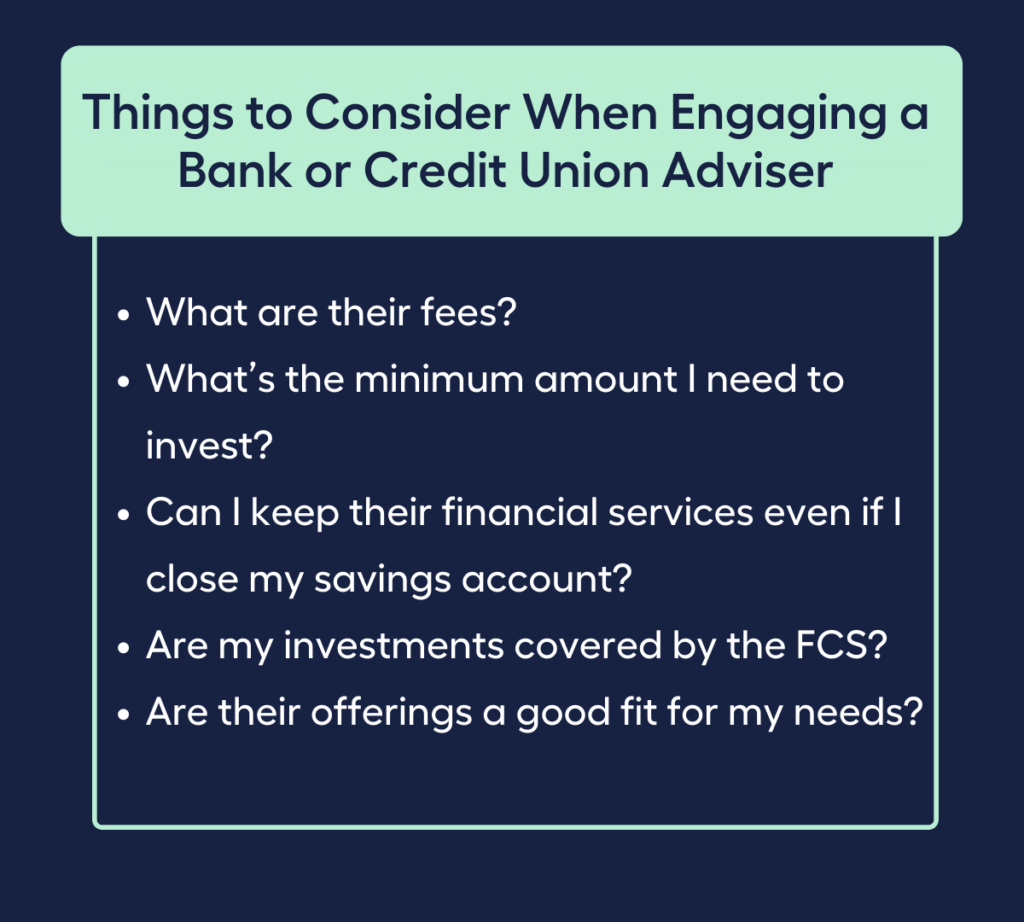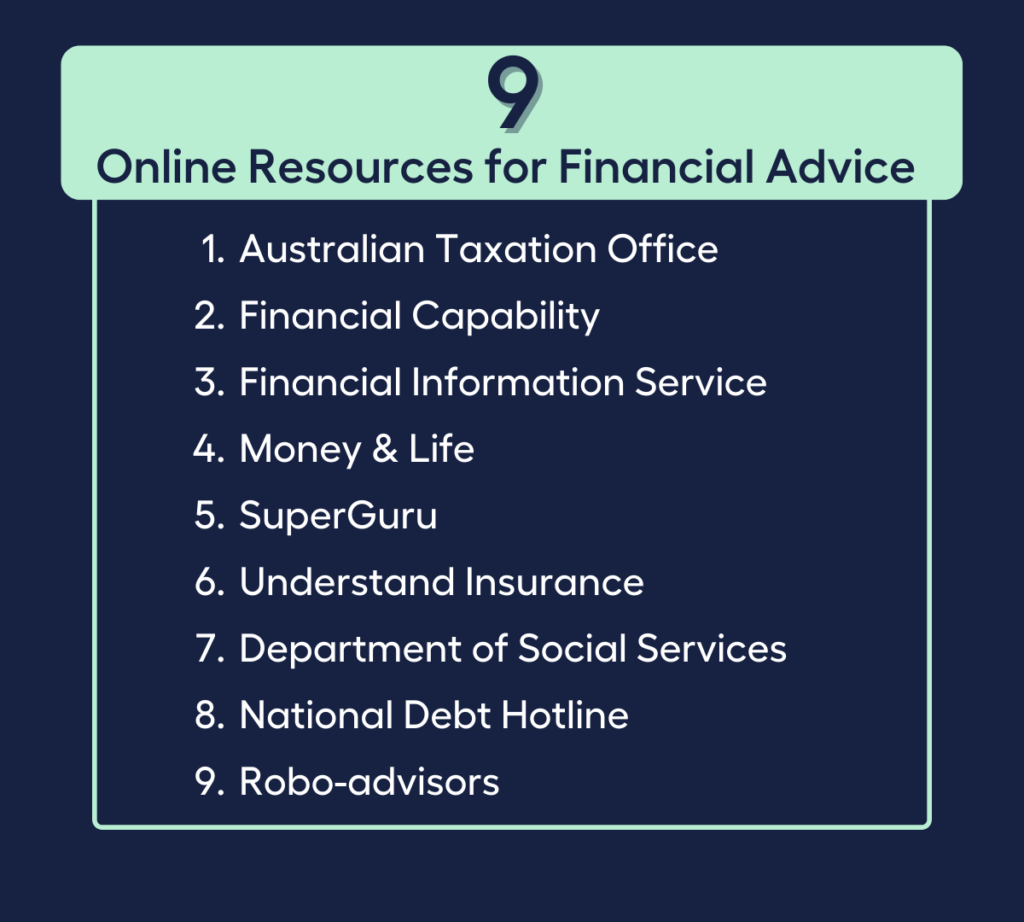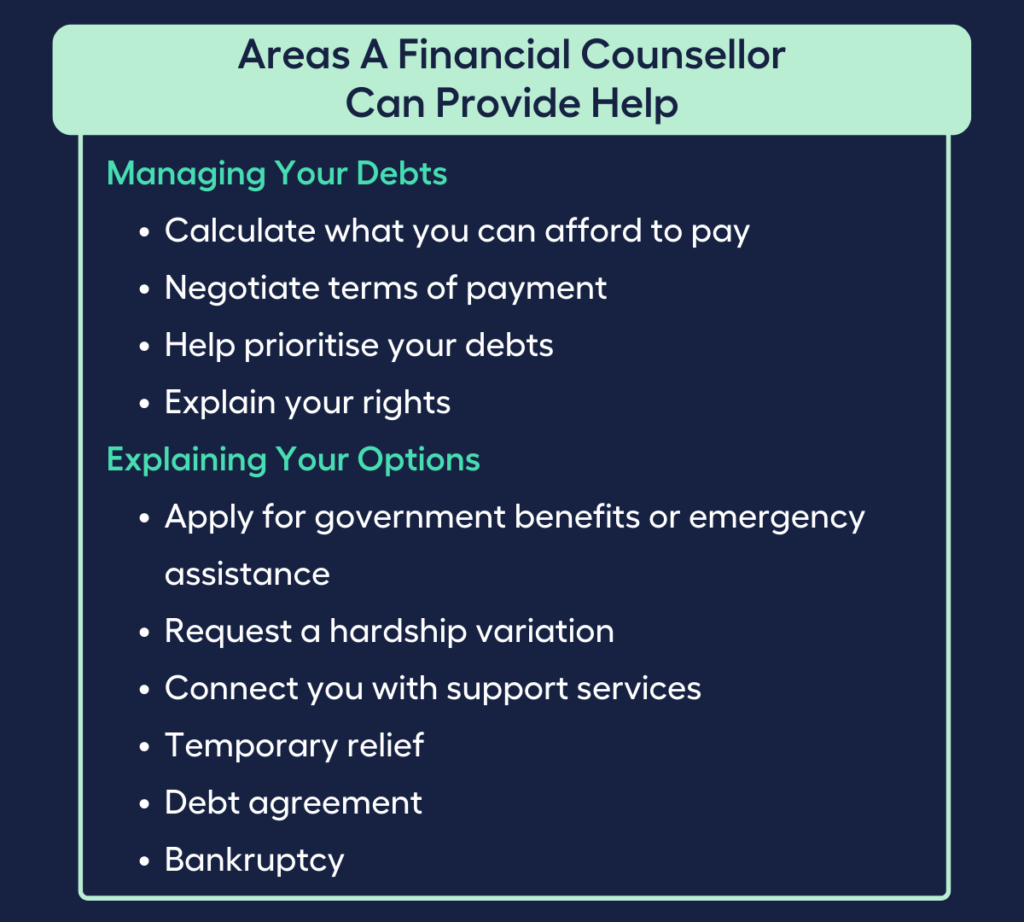Have you ever wondered how much financial advice costs, or perhaps wished you could find financial advice you could afford?
Fortunately, low-cost financial advice is available in Australia today, depending on the specific type of service you need.
In this article, we’ll review where you can find low-cost financial advice, and provide you with answers to the following questions:
How does low-cost financial advice work?
Is low-cost financial advice worth it?

Jump straight to…
What is Considered Low-Cost Financial Advice?
Not everyone has the financial means to pay thousands of dollars for the personalised services of a professional financial advisor. Fortunately, you may be able to find free resources to assist you from your bank, broker, volunteer organisation, or government agency.
Paying a financial expert, however, can be beneficial in certain situations, particularly for those with complex debt, tax, superannuation, investment and estate planning concerns.
It’s always a good idea to start with free resources, but be aware that free resources are typically considered to be general advice and won’t take into account your personal circumstance. Which differs from paid advice which will take into account your personal circumstances.
What is the normal fee for a financial advisor?
Based on a 2020 Financial Planning Association (FPA) member research, financial planners typically charge $3,300 for upfront advice and then an additional $4,300 a year for ongoing guidance.
To give context, your first meeting with a financial planner, which normally lasts 30 to 60 minutes, is often free. During your first meeting, you get to know the investment philosophy of the financial planner and they, in turn, get to know your financial situation, financial needs and goals, and appetite for risk.
If you agree to take up the services of the financial adviser, they then create a financial plan according to your financial needs.
If you get a holistic plan, with various strategies and investment options to increase your wealth and achieve your short term, mid term, and long term financial goals in life, then you may have to pay a fee upwards of $3,300.
Less complicated financial advice focusing on one specific goal, like reducing debt, can cost less than $3,300.
Whatever type of advice you opt for – whether general or a holistic, you have to remember this one important thing other people tend to overlook:
Make sure your financial adviser has the qualifications to be a financial adviser.
Most financial advisers have an Australian Financial Services (AFS) Licence with the Australian Securities and Investments Commission (ASIC), or are authorised to represent a company with an AFS licence.
What budget range do you need for affordable financial advice?
Don’t be crushed if you think the average financial advice cost of $3,300 is quite hefty. Being an average fee means there are services that cost less than $3,300.
The cost of financial advice, after all, depends on two things:
…the type of financial advice you need, and
…the type of fee you agree upon with your financial advisor
Type of Financial Advice
The type of financial advice you require will determine the fee that financial advisors will charge. A comprehensive financial plan would typically start at around $3,300, while simple, one-off advice can be accessed from as little as $400.
We’ve put together a list of financial advice and projected fees to help you get a sense of how much each service will cost. Of course, prices will vary based on your situation, needs and the pricing model of the advisor. One-time fees differ from recurring fees.
| Financial Advice | Estimated Cost |
| One-off advice | Starts at $400 |
| Financial Plan | Starts at $3,300 |
| Estate Plan | Starts at $2,000 |
These financial costs may vary depending on the state or territory, but what remains constant is that financial advisers charge fees depending on the amount of work they have to do.
One thing you can do to help lessen the adviser’s work and reduce your cost is to have your paperwork and documents organised and clear.
Type of Financial Advisor Fees
A financial advisor may be paid in a variety of ways. It can be done through hourly fees, fixed costs or flat fees, or a percentage of your assets under management.
Depending on the advisor and the client’s financial situation, flat or fixed fees can differ. For a financial plan, prices typically range from $3,300 to $8,000.
The hourly rate ranges from $100 to $400. If you choose to go this route, be sure to ask your advisor how long they anticipate it will take to complete the process so you can get an idea of the total cost.
Billing a percentage of assets under management is one of the more common and simple ways financial advisors charge their clients. In general, advisor fees range from 1% to 2% of assets annually.
| Type of Fees | Estimated Costs |
| Flat or fixed fees | $3,300 to $8,000 |
| Hourly fees | $100 to $400 |
| Percentage of assets | 1% to 2% |
Knowing how financial advice works and the budget you need to get one, you can now ask yourself these questions:
What percentage of my money goes to a financial adviser’s fee?
Am I comfortable giving that percentage per year to a financial adviser?
Before you decide, book a complimentary chat with My Money Sorted to check on the options available for you.
Most Common Services Provided by Low-Cost Financial Advisors
Financial advice covers a wide range of the finance spectrum, which may include budgeting, insurance, investments, super funds, taxation, real estate, retirement planning, and estate planning.
It can also include simply advising you on investments or being an authorised representative in selling your assets and investments.
A low-cost financial adviser normally gives simple, general advice. General financial advice doesn’t take into consideration your personal financial situation or goals, or how the financial advice might affect your life goals.
You can also get low-cost personal advice, if the advice is a simple single issue advice, such as what to do with your super fund or what to do with inherited shares.
Finding Affordable Financial Advice
Finding affordable financial advice is not as difficult as some may think. The information age has made things easier for everybody and financial solutions may just be at your fingertips if you know what you need.
Aside from financial websites that offer free information, tips, and tools, you can also go to your bank or credit union for financial advice, as well as Financial Counselling Australia.
Banks & Credit Unions
In days gone past, many banks and credit unions provided the option of using their financial advisers to oversee your finances. If you have an investment account at the bank, they may even offer perks such as lower fees or free bank accounts.
However, since the Royal Commission into Misconduct in the Banking, Superannuation and Financial Services Industry many banks and credit unions no longer offer financial advice in-house.
If they do still provide advice in-house, a credit union or a bank’s financial adviser will most likely be able to provide you with a wide range of financial products and life insurance options. Financial adviser fees should be comparable to those charged by other financial advisers who work independently or for a financial firm.
Although your credit union or bank’s financial adviser may offer free service, there could be a minimal amount that financial companies expect their retail clients to continue to invest in order to maintain their financial services.
It is also important to make sure that your credit union or bank’s investment offerings are a good fit for you, and remember to check if you can keep your investment with them even if you withdraw your deposits.
Finally, keep in mind that the Financial Claims Scheme (FCS) does not cover funds in investment accounts if you choose to work with your credit union or bank’s financial adviser.
Deposits are protected only up to $250,000 for each account holder at each licenced bank, building society, or credit union in Australia under the FCS.

Online Resources
While not offering personal advice, several government and association websites offer online resources to help Australians in developing their financial capability so they can act in their own best interests and take steps towards a future of financial security. Additionally, there are also robo-advisors for investors.

Government and Association websites with Online Resources for Financial Advice
- Australian Taxation Office
- Financial Capability
- Financial Information Service
- Money & Life
- SuperGuru
- Understand Insurance
- Department of Social Services
- National Debt Hotline
Here’s the lowdown on the information these sites provide:
1. Australian Taxation Office (ATO)
Provides basic information on a wide range of financial topics, as well as calculators and tools to help you work out figures.
2. National Financial Capability website
The National Financial Capability website is an online resource that aims to help Australians take charge of their financial lives. It is overseen by the Australian Securities and Investments Commission (ASIC) in collaboration with public, private, nonprofit, community, and academic sectors in order to provide tools and resources in improving financial capability across Australia.
It even has a dedicated page for teens to start them off early in managing their finances.
3. Financial Information Service
A free program offered by the government’s Department of Human Services that seeks to educate and inform consumers about money-related issues.
However, it does not provide financial counselling or advice; it only provides interaction with Financial Information Service (FIS) Officers for general information. Some of the topics their website covers are aged care, investing basics, income and assets, and retirement planning.
3. Money & Life
An online resource run by the Financial Planning Association (FPA) of Australia that is dedicated to assisting Australians in improving their financial well-being.
It offers useful tips and motivating real-life examples to help you improve your financial well-being, reach your lifestyle objectives, and have a positive outlook on your financial future.
4. SuperGuru
A website run by the Association of Superannuation Funds of Australia (ASFA) that offers objective information to help you better engage with and develop your superannuation.
A website managed by the Insurance Council of Australia that provides practical information to help you learn more about insurance and make financial decisions that are appropriate for your requirements.
6. Department of Social Services
The Australian government offers assistance to vulnerable people and families going through financial hardships through the Department of Social Services in collaboration with community organisations.
A few of the services offered are crisis support, access to microfinance products, financial counselling, and help during times of distress.
Their services are free, voluntary, confidential, and typically provided by community organisations.
A not-for-profit service operated by Financial Counselling Australia that provides free, confidential advice from certified financial counsellors in an effort to aid Australians in overcoming debt issues. For more complex financial situations, telephone counselling is complemented by in-person counselling.
Their website also addresses various topics about debt problems and debt solutions.
8. Robo-advisors
One popular low-cost source of financial advice are robo-advisors aka digital advice providers.
Robo-advisors are accessible to regular investors because they are frequently affordable and have low opening balance requirements. They are not the ideal solutions for more complicated problems, such as estate planning, and are better suited for conventional investing such as buying shares.
Financial Counsellors
The Australian Financial Security Authority recommends speaking with a financial counsellor if you’re having financial problems and are unable to afford to pay for financial advice.
Financial counsellors are trained professionals who provide free, unbiased, and confidential services to assist you in regaining control of your finances and discussing your choices for coping with overwhelming debt.
Financial Counsellors can help you manage your debts by providing advice and assistance in determining your ability to pay, negotiating payment terms, prioritising your bills, and outlining your rights.
Financial counsellors will also go over your debt management choices with you. These choices include requesting a hardship variation, getting temporary relief, registering for support services, and applying for government benefits or emergency assistance.
You also get to know the difference between a debt agreement and bankruptcy, which helps you decide the best option for your financial situation and helps you apply for it.

Financial service providers, such as debt consolidation firms, typically provide this advice for a fee. A financial counsellor may be able to provide you with the same service and information for free.
Financial Advisors with Low-Cost Fee Structures
Although most practitioners in the financial planning industry work with flat rates, financial advisors with low up-front fee structures are still common—especially those who work on commission.
Mortgage brokers typically give free advice and earn commission when a deal is done, the same applies to insurance agents.
Also, some super funds provide their members with free basic advice on matters like insurance, investment options, and making additional contributions.
However, if you’re looking for a low-cost, personal financial advice option, talking to My Money Sorted could be worth your while.
Many people may be unaware of this…but just like you, 41% of Aussies intend to get financial advice rather than going it alone, according to an Australian Securities and Investments Commission (ASIC) report.
Find the right Financial Professional for you with the help of My Money Sorted
When you book a call with My Money Sorted, you’ll:
✓ get a better understanding of your financial options
✓ have an idea of the experts you can call on to help you reach your goals
✓ be matched with the right financial planner who can help simplify your family’s journey to financial wellness
My Money Sorted is your stress-free pathway to getting ahead with your money.
Here’s what your journey will look like:
Step 1: Start off with a quick financial assessment session with My Money Sorted
Step 2: Get matched with an affordable, licensed Finance Planner that’s right for your money situation
Step 3: Take the first step towards your money goals with a clear and sound roadmap prepared by an experienced Financial Planner.
It’s that easy!
Speak with My Money Sorted Today About Your Retirement Planning Needs and Get Your Money Sorted Today






